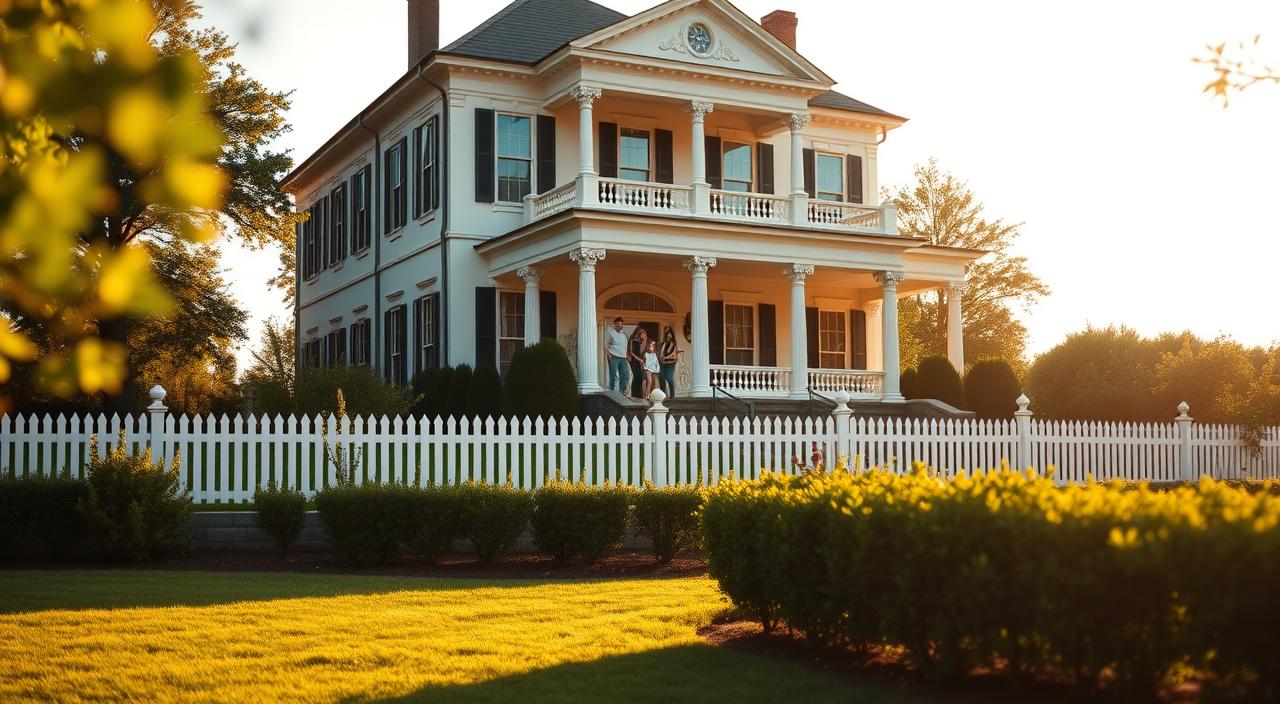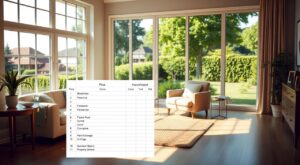Freehold ownership gives you full control over your property. This is a big advantage. It’s important to think about the good and bad sides of owning freehold. For more info, check out freehold property resources.
Knowing the pros and cons of freehold is key to a smart choice. The main benefit is having full control over your land. This is a big plus of freehold ownership.
Introduction to Freehold Ownership
Freehold ownership means you own your property outright. There are no outside claims on it. This lets you decide how to use and develop your property.
Key Takeaways
- Freehold ownership offers full ownership rights and control over the property.
- Understanding the pros and cons of buying freehold is essential in making an informed decision.
- Freehold property advantages include having complete control over the land and its use.
- Freehold ownership provides owners with the ability to make decisions on the property’s use and development.
- The pros and cons of buying freehold should be carefully considered before making a purchase.
- Freehold ownership can provide a sense of security and stability for property owners.
Understanding Freehold Ownership
Freehold ownership means you own the land and any buildings on it outright. It’s often seen as better than leasehold because you have greater autonomy and long-term security. But, it comes with higher costs and maintenance duties.
One big plus of freehold is you can change your property as you like, without needing permission. This is great for those who want to renovate or extend their property. It also brings a sense of stability and permanence, which is good for families or those staying long-term.
- Complete ownership of the land and buildings
- No leasehold restrictions or limitations
- Greater control over property maintenance and repairs
Freehold ownership has many benefits, like more control and autonomy. But, it’s key to weigh the downsides before deciding.
Advantages of Freehold Ownership
Choosing freehold property means you have more control over your home. You can make changes and decisions without limits. This freedom is a big plus compared to leasehold properties.
Freehold properties are also seen as a safer investment. You can improve your property to increase its value. This means you can attract more buyers or renters. You don’t have to worry about losing your property or lease ending.
- Greater control over property decisions
- Financial stability and investment opportunity
- No leasehold limits or restrictions
- Flexibility in renovations and modifications
Freehold ownership is appealing for those looking to invest in property or own a home. Knowing the benefits helps you make the right choice for your needs.
Disadvantages of Freehold Ownership
Freehold ownership has its pros and cons. It gives you more control and financial stability. But, there are also downsides to think about. One big drawback of buying freehold is the high initial cost. Freehold properties usually need a bigger upfront payment, which can be hard for some buyers.
Another important thing to think about is the considerations for freehold buyers. This includes maintenance costs and zoning restrictions. These can affect the property’s cost and livability. Key considerations include:
- Maintenance costs: Freehold owners handle all maintenance and repairs, which can be expensive and time-consuming.
- Zoning restrictions: Zoning laws can limit how you use the property. Any changes or renovations might need special permits.
- Property taxes: Freehold owners pay property taxes, which can go up over time.
It’s important for buyers to think about these points carefully. They should consider their own situation before deciding. By knowing the drawbacks of buying freehold and the considerations for freehold buyers, you can make a choice that fits your needs and budget.
Comparing Freehold and Leasehold Ownership
When looking at freehold ownership, it’s key to understand the difference between freehold and leasehold. Freehold means you own the land outright, giving you full control. Leasehold, on the other hand, means you rent the land from someone else for a set time. Knowing the differences helps you make a smart choice.
Freehold ownership offers long-term security and the freedom to change your property as you wish. But, it usually costs more upfront. Leasehold, with its lower initial costs, might seem appealing. Yet, it can limit your ability to make changes and may have lease renewal problems.
- Ownership duration: Freehold is forever, while leasehold has a time limit.
- Property maintenance: Freehold owners handle upkeep, but leasehold owners might get some help from the freeholder.
- Flexibility: Freehold owners can make more changes, but leasehold owners face more restrictions.
By carefully weighing the freehold vs leasehold comparison, you can choose what’s best for you. This depends on your needs and what you prefer.
Financial Aspects of Freehold Ownership
Understanding the financial side of freehold ownership is key. Upfront costs are high, but they can lead to long-term gains like higher property value and rental income. Yet, it’s important to think about the downsides, like maintenance and taxes.
Freehold ownership means you have full control over your property. You also avoid paying ground rent. Houseboat ownership offers unique perks, like fishing anytime and enjoying nature. It’s vital to balance these benefits with the possible drawbacks.
Upfront Costs Explained
Initial costs for freehold ownership include the purchase price, closing fees, and any needed repairs. These expenses are big, but they can lay the groundwork for future financial success.
Long-term Financial Benefits
Freehold ownership can bring long-term financial gains. These include higher property value, rental income, and tax advantages. Knowing the risks and understanding the financial aspects well can help you make smart investment choices.
Maintenance Responsibilities in Freehold
When looking at freehold ownership, considerations for freehold buyers include maintenance duties. Freehold owners handle property upkeep, giving them control and independence.
Freehold owners can evaluate the pros and cons of maintenance, like septic tanks. This lets them make choices that fit their needs.
Benefits of handling maintenance include:
- More control over upkeep and repairs
- Ability to tailor the property to personal needs
- Potential savings over time with proactive care
But, there are downsides too. Unexpected repairs can be costly, and maintenance takes time. By weighing these points, buyers can decide if freehold ownership suits them.
Legal Considerations for Freehold Owners
Being a freehold owner means you need to know the legal side of things. There’s a risk of property disputes or zoning changes. But, owning freehold has big advantages like full control over your property and no leasehold limits.
Freehold owners can handle legal issues by knowing their property rights. They should get title insurance for financial protection against title disputes or other problems.
Understanding Property Rights
Knowing your property rights is key for freehold owners. It helps avoid problems and makes sure you’re getting the most from your investment. You should know your rights and duties as a property owner and any local laws that might impact your property.
Importance of Title Insurance
Title insurance is very important for freehold owners. It protects you financially in case of title disputes or other issues. By getting title insurance, you can enjoy the benefits of freehold ownership without worrying about risks.
Market Trends Affecting Freehold Ownership
The market for freehold properties is shaped by many things. These include economic trends, government policies, and changes in the population. Knowing why to choose freehold property is key. It offers more control over the property and could lead to long-term financial gains.
In recent years, investors have been drawn to freehold properties. They look for stable and secure investments. The trend shows a move towards freehold ownership, with many choosing to own their property outright. Key factors include:
- Low interest rates, making it easier for buyers to secure financing
- Government incentives for first-time homebuyers
- Increasing demand for housing, mainly in urban areas
Recent research suggests a bright future for freehold properties. Experts predict continued growth in the market. As demand for freehold properties grows, it’s vital for buyers to know the benefits. They should also think carefully about their choices.
In conclusion, the trends affecting freehold ownership are complex. They are influenced by many factors. By understanding the current and future market, buyers can make smart choices. They can decide between freehold and leasehold based on their needs.
Tax Implications of Freehold Ownership
Freehold ownership comes with tax benefits and drawbacks. One big plus is the chance to save on taxes. As a freehold owner, you might get to deduct property taxes from your income. But, you should also know that owning freehold can lead to higher taxes.
Freehold owners must pay property taxes, which change based on location and property value. Property tax rates can greatly affect the cost of owning a freehold property. Many owners look for ways to lower their taxes, like tax deductions and exemptions.
Some tax benefits of freehold ownership include:
- DEDUCTIONS: Freehold owners might get to deduct mortgage interest, property taxes, and operating costs.
- TAX CREDITS: There are tax credits for things like energy-efficient upgrades for freehold owners.
- EXEMPTIONS: Some freehold owners won’t have to pay capital gains tax when they sell their property.
In summary, knowing the tax side of freehold ownership is key to smart property decisions. By understanding the benefits and drawbacks, you can better handle property taxes and maximize your investment.
Community and Lifestyle Factors
Thinking about freehold ownership means looking at community and lifestyle aspects. Reasons to choose freehold property often include the chance to engage with the community and enjoy lifestyle flexibility. For example, freehold owners can make changes to their property, giving them more control.
Freehold buyers should think about community involvement and lifestyle choices. For instance, freehold owners can:
- Join in community events and help make decisions
- Change their property without needing permission
- Feel a sense of permanence and stability
Freehold ownership also brings lifestyle flexibility. It lets you choose your own lifestyle and decide on your property without others’ opinions. By weighing these considerations for freehold buyers, you can decide if freehold ownership fits your needs.
Making the Right Decision for You
When thinking about freehold ownership, it’s key to think about what you need and want for the future. Buying a freehold property means looking at your money, lifestyle, and plans ahead. These are big things to consider.
If you want more control and freedom to change things up, freehold might be for you. But remember, it costs more upfront and you’ll have to handle upkeep yourself. Also, check if there are any zoning restrictions that could limit how you use the property.
Choosing freehold ownership should be a careful thought after looking at your personal situation and goals. By understanding both the downsides and upsides, you can pick the best option for you. This way, you get the control and stability you’re looking for in your investment.



